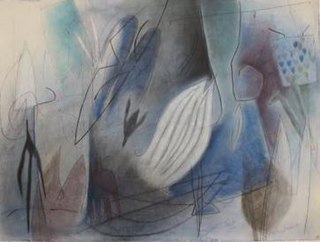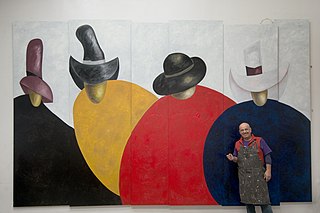Related Research Articles

Emmi Whitehorse is a Native American painter and printmaker. She was born in Crownpoint, New Mexico and is a member of the Navajo Nation. She lives in Santa Fe, New Mexico and grew up on the open land northeast of Gallup, New Mexico in a family where only the Navajo Language was spoken.
Diego Romero is a Cochiti Pueblo artist living in New Mexico.
Mario Martinez is a Native American contemporary abstract painter. He is a member of the Pascua Yaqui Tribe from New Penjamo, the smallest of six Yaqui settlements, in Arizona. He currently lives in New York City.

Douglas Kent Hall was an American writer and photographer. Hall was a fine art photographer and writer of fiction, poetry, nonfiction, essays, and screenplays. He was in high school when he first published a story, his first published photographs were of Jimi Hendrix and Jim Morrison, and his first exhibition of photographs was at the Whitney Museum of American Art.
Mark Mann is an American artist known for utilizing visual elements from 1960s and 1970s postcards to form the basis of his photographic art works. The resulting pictures create an uneasy tension between truth and fiction. They cite artifacts from the time, such as roadside motels and vacation destinations that refer to memories of family journeys. The journeys are mixed with dreamlike symbolism to create ironic images that go beyond memory. They are dramas staged to communicate the loneliness and alienation that accompanies the American dream.

Temple is a train station in Temple, Texas, United States served by Amtrak, the national railroad passenger system. The station was originally built as an Atchison, Topeka and Santa Fe Railway depot. East of the station on another railroad line through Temple, a former Missouri-Kansas-Texas Railroad depot can be found, as the nexus for trains bound for Waco, San Antonio and Houston.
Fletcher C. Benton was an American sculptor and painter from San Francisco, California. Benton was widely known for his kinetic art as well as his large-scale steel abstract geometric sculptures.

Guilloume Perez is a Colombian minimalist artist, self-described master of "Bolismo". His work has been noted by a magazine covering North America's Southwest. He is known primarily for his sculpture and painting.

Dario Robleto is an American transdisciplinary artist, researcher, writer, teacher and “citizen-scientist”. His research-driven practice results in intricately handcrafted objects that reflect his exploration of music, popular culture, science, war, and American history.
Teri Greeves is a Native American beadwork artist, living in Santa Fe, New Mexico. She is enrolled in the Kiowa Indian Tribe of Oklahoma.
R. B. (Roger) Sprague was an American Contemporary Realist artist.

Bob Haozous is a Chiricahua Apache sculptor from Santa Fe, New Mexico. He is enrolled in the Fort Sill Apache Tribe.
Jacobo de la Serna is a ceramic artist, Spanish Colonial scholar and painter. His work is exhibited in permanent collections around the United States.
John Geldersma is known for his wooden sculptures of, what he calls, "contemporary tribalism".
Tammy Garcia is a Santa Clara Pueblo sculptor and Ceramic artist. Garcia translates Pueblo pottery forms and iconography into sculptures in bronze and other media.

Jane Dunnewold is an textile artist and author. She had been the president of the Surface Design Association.
Robert Ray was an American artist, active in the middle to late twentieth century.
Holly Roberts is an American visual artist known best for her combination of photography and paint. “Holly Roberts caused a stir in the fine art photography world of the eighties by fusing painting and photography, painting directly onto photographs”. Roberts lives and works in Corrales, New Mexico. Her work is in the permanent collection of several museums in the United States.

Matt Magee is an American contemporary artist who is best known for his minimal abstract geometric paintings, sculptures, prints, assemblages, murals and photographs. He was born in Paris, France in 1961 and moved from there to Tripoli, Libya and then to London. He moved to Brooklyn in 1984 to attend Pratt Institute for an MFA after completing a BA in Art History at Trinity University in San Antonio, TX. He maintained a studio on New York City until 2012 and currently lives in Phoenix, AZ.
Postcommodity, a Southwest Native American Artist collective, was founded in 2007 by Kade Twist and Steve Yazzie Their name refers to the "commodity era" of Native American art trading in the late 1800s and 1900s, with the "post" being in reference to their modern take on traditional Native art forms.
References
- ↑ "Hib Sabin". AskArt.com. AskART. Retrieved March 13, 2015.CS1 maint: discouraged parameter (link)
- 1 2 3 4 "Artist: Hib Sabin". StoningtonGallery.com. Stonington Gallery. Archived from the original on April 2, 2015. Retrieved March 13, 2015.CS1 maint: discouraged parameter (link)
- ↑ "Manitou Galleries: Roger Hayden Johnson & Hib Sabin". Southwest Art. June 2013. Retrieved March 13, 2015.CS1 maint: discouraged parameter (link)
- 1 2 Abatemarco, Michael (20 December 2019). "Nature of the beast: The sculpture of Hib Sabin". Pasatiempo/The New Mexican. Retrieved 16 November 2020.CS1 maint: discouraged parameter (link)
- 1 2 3 "Hib Sabin Biography". Mockingbird-Gallery.com. Mockingbird Gallery. Archived from the original on April 3, 2015. Retrieved March 13, 2015.CS1 maint: discouraged parameter (link)
- ↑ Gangelhoff, Bonnie (15 May 2017). "Hib Sabin explores the human condition through myth and symbol". Southwest Art. Retrieved 11 October 2020.CS1 maint: discouraged parameter (link)
- ↑ Gangelhoff, Bonnie (July 2003). "Carved and Chiseled Out". Southwest Art.
- ↑ "Rotating Art at Sea-Tac Airport". PortOfSeattle.com. Port of Seattle. Retrieved March 13, 2015.CS1 maint: discouraged parameter (link)
- ↑ "Hib Sabin: Bio". LRossGallery.com. L Ross Gallery. Retrieved March 13, 2015.CS1 maint: discouraged parameter (link)